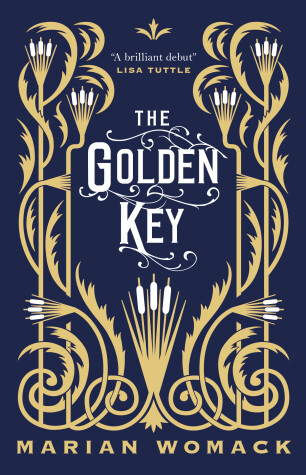
Jo
Written on Jun 16, 2020
Trigger & content warnings are under spoiler tags as there are a few of them.
Trigger/Content Warnings: This book features the word g*psy, and prejudice against the traveller community, misogyny of the time, animal cruelty, animal death, people in a catatonic state, child death, mention of abusive marriages, child abuse, mention of death by suicide, and problematic language around suicide.
About occultism and a supernatural mystery, The Golden Key by Marian Womack sounded right up my street, and I jumped at the chance to review it! But this is absolutely a marmite book, and I can't really figure out if I loved it or was really disappointed.
Samuel Moncrieff has left university and come to London to live with his godfather, Charles Bale, after a tragic event in Norfolk. The woman he loves has died, and he is swimming in grief. Charles is a member of a spiritualist group, and spiritualism has become the interest of the moment, with the death of Queen Victoria. Séances abound, and through his godfather, Sam meets various spiritualists and mediums - one being Helena Walton-Cisneros.
Charles has arranged a meeting between Helena and Lady Matthews, an old friend of his, who wants Helena to use her abilities to solve the mystery of the disappearance of her three stepdaughters on the Norfolk Fens twenty years ago. Helena isn't all she appears, more interested in facts than fancy, and is determined to figure out exactly what happened.
Eliza Waltraud, a scientist living in Norfolk, has discovered that things are disappearing. Birds, insects. Instead, a strange pulpy grass, and a green light that moved over the fens. A tudor manor in ruin, covered in fungi, that can only be described as haunted.
The Fens are not shrouded in only fog, but also superstition and fear, and the unexplained.
First off, I think it's important to note that Samuel Moncrieff isn't mentioned in the blurb on the back of the book, and there's no mention anywhere of Eliza Waltraud, which matters, because, although Helena Walton-Cisneros narrates most of the book, she doesn't actually start narrating until chapter four, 71 pages into the story. The mystery she is to solve doesn't actually come up until a little before then. So if a reader is going off the blurb alone, I think they might be a little confused as to why these other people narrate the first three chapters.
The Golden Key is incredibly slow. To be honest, until roughly two thirds of the way in, not a huge deal actually happens - and some of the things that do are almost unrelated (or rather, they seem unrelated for most of the book, but their relation isn't entirely explained. I think I know what was going on and how they relate, but I can't be sure). A lot of this book is internal third-person dialogue. Helena thinking, asking herself questions, trying to figure things out. All three narrators remembering things from the past - paragraphs and paragraphs of memories. There's a lot of observation, a lot of reflection, a lot of questions. And a lot of description of the Fens, the tudor house. So much of what you read is what is going on inside the narrators' heads, it's the kind of book I can't imagine being made into a movie, because how do you translate that? But if it's so slow, why did I keep reading?
Because at the same time, I absolutely loved the writing style; so eerie and descriptive. It's just so gorgeous! The atmosphere Womack creates with her words is palpable. The tudor manor has it's own presence, like it's alive, trying to draw you in. There's an almost constant sense of being watched, of not being alone. The writing and atmosphere had me completely gripped. As did the mystery. Really, how do three girls just vanish, without a trace? There's something going on in those Fens, and I was desperate to find out. There was also this constant feeling that Helena was just on the verge of discovering something that would finally make it all make sense.
That's another thing. This book is quite confusing. It's not linear, for one thing, but you're never told that. It's written like the events that take place are being told in chronological order, but quite a ways into the book you discover that something that happened in the middle of the book actually took place before the book started. And it's kind of disjointed, too. So many times I thought that I had missed something, or somehow forgot something, because things would be discussed as if the reader already knew about certain discoveries or elements that weren't the case.
And then there's the ending. I don't really know what happened. I mean, I could tell you what I think was going on, but it's really kind of hazy. I could say I think X happened, but not why or how, or even what exactly X is. We get no straight, definitive answers. There are hints, things are alluded to, but at no point does anyone say, "The three girls disappeared because XYZ. ABC is what happened." It has such an open ending! There's so much information the reader isn't privy to; a document that is read by Helena, for example, that she is shocked by, that we never get to read, the contents only hinted at. But there were other things going on in the story, we discover, that aren't exactly resolved at all. Again, hinted at, enough info to have theories, but no certainties. So many questions!
But here's the thing. From the acknowledgements, it's clear that Womack has ideas for sequel/s, but states that it's up to the readers whether they come about at all. But the way the story ends, I get a feeling that this particular story, the mystery of the three girls, has concluded. Any sequel will not be about solving this mystery. It has been solved, the reader just doesn't have the answers that Helena, Elena, and Sam have, nor exactly what those answers lead them to do. Not exactly. But there are those elements that I have theories about that I feel will actually be quite important to any sequels. Some answers we may get. And because of that, and because of what happens at the end (what does happen?!), I do think a sequel will give us some answers about the events in this book. I can't see how it can't.
And to be completely honest, I absolutely cannot stop thinking about this book! About what happened, about what that will mean for certain characters, about what happened to other characters. About my theories, and how all things may connect to each other. About what that means in the greater scheme of things, and how it will effect future stories. I am absolutely desperate to read more, and get my answers! Even with the incredibly slow pacing. Even with all the confusion. Even with an ending that had me so frustrated, because what actually happened?! As much as I was disappointed and frustrated and confused by this book... I think I kind of love it. And I will absolutely be reading the sequel, if it's published.

